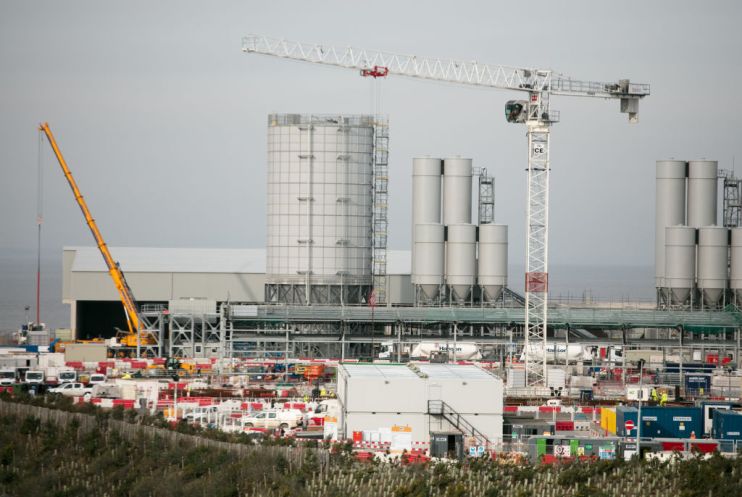Going Nuclear: Can Boris Johnson really ramp up nuclear power?

Garden bridges, routemaster buses, oven-ready Brexit deals…Prime Minister Boris Johnson is no stranger to eye-catching pledges and, in fairness, he occasionally achieves them.
His latest media-friendly commitment for “big new bets” on nuclear is typical Johnsonian politics: brash, bold and intentionally vague.
This is reflected in the UK’s nuclear strategy – which is powered by enthusiasm but weakened by a lack of details.
On the one hand, Business Secretary Kwasi Kwarteng has brought in the Regulatory Asset Base (RAB) model to power the construction of projects with public money.
The government has also encouraged Rolls-Royce’s plan to build small modular reactors (SMRs) across the country, and has approved plans for light water reactor Sizewell C, while the much-delayed Hinkley Point C is expected to open in 2026.
However – there remains no specific target for the UK’s nuclear capacity – and the financial commitments remain threadbare.
Its net zero ten-point plan published last October only includes up to £385m for an Advanced Nuclear Fund, and £170m for research and development on next-gen technology such as Advanced Modular Reactors (AMRs) that could unlock hydrogen and synthetic fuels.
For context, Hinkley Point C is estimated to have cost £23bn.
| Power Plant | Connected to Grid | Closing Date | Net MWe |
| Hinkley Point B | 1976 | 2022 | 840 |
| Hartlepool | 1983 | 2024 | 1190 |
| Heysham 1 | 1983 | 2024 | 1160 |
| Heysham 2 | 1988 | 2028 | 1240 |
| Torness | 1988 | 2028 | 1205 |
| Sizewell B | 1995 | 2035 | 1195 |
Currently, nuclear power only makes up 16 percent of domestic energy generation – way down from its 25 per cent peak – with five of the UK’s six operational power stations set to close by the end of the decade.
This would halve output to just 4.45 MGW nationwide.
Johnson hopes to revive the industry – holding a roundtable yesterday with nuclear energy chiefs – but has found himself facing resistance from his Chancellor, Rishi Sunak.
Downing Street’s much-awaited energy security plan following Russia’s invasion of Ukraine has even been pushed back as Sunak dithers over whether to greenlight funds for ramping up nuclear power.
The hesitancy from the Chancellor raises a key question: is bulking up nuclear power to ensure supply security even a feasible goal?
Funding and clear strategy crucial for boosting nuclear’s role
Dr Peter Bird, managing director at Berkeley Research Group, told City A.M. a high standard of living requires high energy consumption.
If the West is to pivot from oil and gas – he argued nuclear power is a highly attractive alternative, as it is the only significant source of low carbon power with 24/7 reliability.
However – Dr Bird warned investment is essential, and the government needs to “give greater certainty to the money that will be committed, and what needs to be delivered in return.”
In particular, he noted AMRs still needed to be justified on a commercial scale, while expanding the UK’s portfolio of light water reactors will require investment, with no sustainable long term private model currently in place.
As for the government’s already pledged nuclear power projects, he was optimistic about the two light water plants but remains uncertain about Rolls-Royce’s mini power stations.
Dr Bird said: “There may be delays to Sizewell and Hinkley point, but we expect them to be delivered. SMRs still need to be proven and to be developed in large enough numbers to deliver the construction economies of scale needed to make them viable.”
Tom Greatrex, Nuclear Industry Association chief executive told City A.M. he was frustrated at the lack of progress in new projects over recent years.
He said: “It is clear that the pace of delivery must be more urgent – the sense of mission is critically important, both to investors and also the supply chain.”
However, Andy Mayer, energy analyst at the Institute of Economic Affairs had a less charitable view of the delays in building nuclear projects domestically, and questioned its role in the current short-to-medium term strategy of securing UK energy independence.
Speaking to City A.M., he said: “The central issue with nuclear power is that we need it, but the projects on offer are at least ten years away, cost more than billed, and will be delivered late.”
He described the escalating costs for Hinkley Point C as a “national embarrassment” and advised the government to “keep the risk of failure on the producers not the public.”
When approached for comment, industry body Energy UK revealed it remains bullish about nuclear power, suggesting it has a critical role in reaching net zero – with the UK needing to quadruple current low-carbon capacity levels reach its emissions targets over the next three decades.
Adam Berman, deputy director at Energy UK said: “A strong UK nuclear fleet complimented by renewables and increased system flexibility and storage can drive forward the UK’s energy transition and assure our future energy security”.
Nevertheless, it is clear that the government will need to outline where the investment will come from in clear terms with stated objectives.
This makes Johnson’s alleged impasse with Sunak more than just palace intrigue – instead, it could be a painful bottleneck in the country’s energy ambitions.